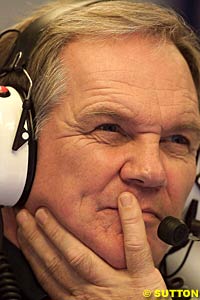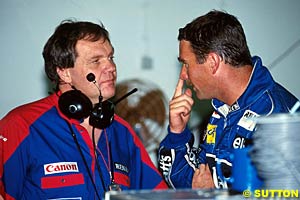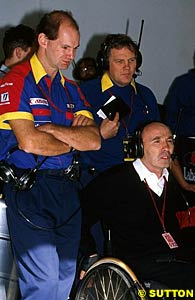
Part III: Patrick Head
Atlas F1 Editor in Chief
The 1992 season was very much about the FW14B as it was about Nigel Mansell, and so we asked Williams's technical director Patrick Head to recollect the 1992 season - from his perspective. This is how he remembers it
"It was certainly a very interesting year technically," Patrick Head, part owner and technical director of WilliamsF1, recalls, "because it was the first full year that we ran an active ride system. We ran this system, which we we had developed, first of all in a race at Monza 1987, and then introduced on our 1988 car, with that active ride system as an integral design part of it, and we withdrew it halfway through the year, because basically we had too many problems with the car, with the engine, installaion with various cooling problems. The active ride was just one problem too many. So we removed it in the middle of 1988, and then we carried on developing - including through 1991 when we were running the FW14.
"So I think we were so busy keeping the active ride reliable and functioning, and trying to get the best out of it and trying to understand exactly how it was operating, that we weren't as... I think we felt that it was an incredible challenge to try and get such a complex car - because it was quite complex - to be reliable. So I don't think we had a lot of time to sit back and think how clever we were and think, 'goodness me we're on pole by a second' or anything like that."
Q: Going into the season, you didn't realize that you had a car that's going to thrash the field? You didn't realize it?
Head: "Oh I think we thought the FW14 was a very good car anyway, and the only reason we ran the active ride was that it was going to add to it. But you never know when you start the season whether somebody else is going to come up with something that's even better than you have done, and when you go out running... well, it was very clear that when we went to the first Grand Prix of 1992 that we did have a considerably superior car to anybody else's, yes."
Q: What was the feeling like? Were you elevated?
Head: "It was certainly good to be in a strong position competitively, and it was sort of the beginning of when McLaren - who had been very strong with Honda - were beginning to sort of pull away, but we went through a sort of unpleasant time with Nigel Mansell who we came to an agreement with at Silverstone, in April. It was a full verbal agreement about the contract for the following year, for 1993, and because he was winning GPs repeatedly, every time he won a GP he suddenly decided that his value would become higher.
"What Frank and I understood was an agreement - and normally when you make an agreement and you shake hands on it, our view was that was a binding agreement, yet Nigel decided it wasn't. And as he won more races, he decided he's more and more valuable, so we went through a rather unpleasant period which culminated in Nigel deciding to leave the team at Monza, in 1992.
"So in the background of what was an extremely successful time in effect, we lost the man that we had assisted and had worked with us to become World Champion - as it was in that particular case not to another F1 team but to an IndyCar team."
Q: I remember back then the phrase used was 'even a monkey could win' in your car, and I always wondered how true that is: do you think any driver, if put in that position, could have clinched the Championship?
Head: "Well, in 1991, Riccardo and Nigel were very similar on performance, and in the early part of the year Riccardo was stronger than Nigel. But Nigel took to the active ride car better than Riccardo did, and it had some very different characteristics.
"So undoubtedly Nigel was much more dominant in '92 relative to Riccardo. And Riccardo had the same car and he didn't win the WC, so I think it's a bit of an insult to say 'even a monkey' - ' if you're not in the quick car...' that's the sort of derogatory thing somebody who feels a bit bitter about not winning might like to say, yes."
Q: What was your favourite race of the year, that one race that stuck out for you?
Head: "Well certainly Nigel was very strong at Silverstone and qualified ummm probably 1 and a quarter seconds ahead of Riccardo and nearly 2 seconds ahead of the third driver, and he just drove into the distance in the race and won the race very easily.
"Nigel always used to 'turn it on' when he was at his home track anyway, so... I mean, we won 29 GPs with Nigel - and he won 31 in his career, the other two with Ferrari - in the 4 or 5 years with us. So he was one of our most successful drivers, but... he was... he was quite an actor, Nigel, quite a performer.
"He wanted the team to live all his highs and all his lows with him.... he had his moments, absolutely, and sometimes we found it rather exhausting. He was a great racing driver and was one of the few drivers that could dominate the circumstances around him. But he was a drama queen, yes."
Q: Did you think there was a certain poetic justice in him clinching the '92 title because of 1986 and the way he lost it?
Head: "Yes, but I mean you know as well as I do that life doesn't necessarily offer fairness and equalness. But, I mean, it certainly... [thinking]... Either of our two drivers should have been in a championship winning position in '86; it was an extremely difficult year for us, because it was the year in which Frank broke his neck. I was having to be involved in business aspects; our relationship with Honda; and oversee the racing of the cars technically. So it was an intensely busy year."
Q: Did all that make '92 allthemore rewarding?
Head: "We certainly felt that Nigel deserved to win the World Championship - he was so close to it before."
Q: And what about you? Frank? The team?
"Then we joined up with Renault; did a bit better in '89, didn't really make progress in '90, and then started making serious progress in 1991."
Q: I seem to recall somebody saying that active suspension was banned at the end of 1993 because you became so dominant, that the teams and the organising body wanted to take away the element that made you win all the time. Did you feel that the paddock was ganging up on you, trying to find a way to slow you down?
Head: "I think obviously Formula One - and the people that run Formula One - are never very keen with domination by one team, they want to see competitive racing. And where it was easy to isolate a particular technology and blame that for the domination... I mean, it's going to be quite difficult to act against Ferrari now, for example. You can't really ban aerodynamics - I'm sure they have other strengths but Ferrari's strength now is aerodynamics - and it's rather difficult to ban such a thing.
"But it was very easy in 1992 or 1993 to say that we were very strong because we were running active ride and we were the best at getting the best out of active ride, so they banned it."
Q: Finally, can you imagine the 1992 season being as successful if it wasn't Nigel Mansell at the wheel?
Head: "I don't think neither Frank nor I spend a lot of time thinking what might have been or could have been - we're fairly pragmatic people. I think Nigel played a pretty strong part in helping us get where we were in 1992, and he very much took the car by the scruff of the neck and wrung its neck and got the best out of it. And you can hardly blame the driver for being a second a lap faster than anybody else.
"Yes, you tend to get these comments - you know, even a monkey could drive that car - but in reality that isn't the case, is it?"
Q: You don't reminisce, do you, Patricků
Head: "No, no. I don't really tend to look back much and recollect an awful lot of the details. When I am seriously an old man, though, I might reminisce. But by then I probably won't remember much anyway."
 "And then, halfway through 1991, we did an installation of the active ride on the FW14, and we took that to Australia and just used that in practice. It was an expensive decision to fly an extra car to Australia, but we were interested in making the decision of whether we thought we were able to run the car in a competitive GP environment, because obviously it was a more complex car, and we did make the decision that the car for 1992 would be the '91 FW14 but with the active ride suspension added to it.
"And then, halfway through 1991, we did an installation of the active ride on the FW14, and we took that to Australia and just used that in practice. It was an expensive decision to fly an extra car to Australia, but we were interested in making the decision of whether we thought we were able to run the car in a competitive GP environment, because obviously it was a more complex car, and we did make the decision that the car for 1992 would be the '91 FW14 but with the active ride suspension added to it.
 "One of the characteristics was that you had to trust that it was going to provide you with the grip into the corner - it didn't give you good feeling as it was entering a corner, because it was working out exactly what attitude it should be at. And for a period, entering a corner, it probably felt to the driver fairly uncertain. Once Nigel worked out that it was going to feel OK later in the corner, he was happy to trust it, whereas Riccardo wanted trust in real time - i.e. he wanted the feedback from the car immediately.
"One of the characteristics was that you had to trust that it was going to provide you with the grip into the corner - it didn't give you good feeling as it was entering a corner, because it was working out exactly what attitude it should be at. And for a period, entering a corner, it probably felt to the driver fairly uncertain. Once Nigel worked out that it was going to feel OK later in the corner, he was happy to trust it, whereas Riccardo wanted trust in real time - i.e. he wanted the feedback from the car immediately.
 Head: "Well, we did win the WC in '87 with Nelson Piquet, and we won the Constructors Championship in '86 and '87. And then we lost the Honda engine at the end of '87; had a very weak year where we only scored twenty-something points in '88. McLaren had a strong year, we had a weak year.
Head: "Well, we did win the WC in '87 with Nelson Piquet, and we won the Constructors Championship in '86 and '87. And then we lost the Honda engine at the end of '87; had a very weak year where we only scored twenty-something points in '88. McLaren had a strong year, we had a weak year.
Please Contact Us for permission to republish this or any other material from Atlas F1.
|
Volume 8, Issue 32
Atlas F1 Exclusive
Absolute Domination, Part I: The Champion
Absolute Domination, Part II: The Races
Absolute Domination, Part III: Patrick Head
Atlas F1 Special
Ground Supremacy
Measuring the Quintuple Champs
Articles
View from the Paddock
Columns
Rear View Mirror
Elsewhere in Racing
The Weekly Grapevine
> Homepage |